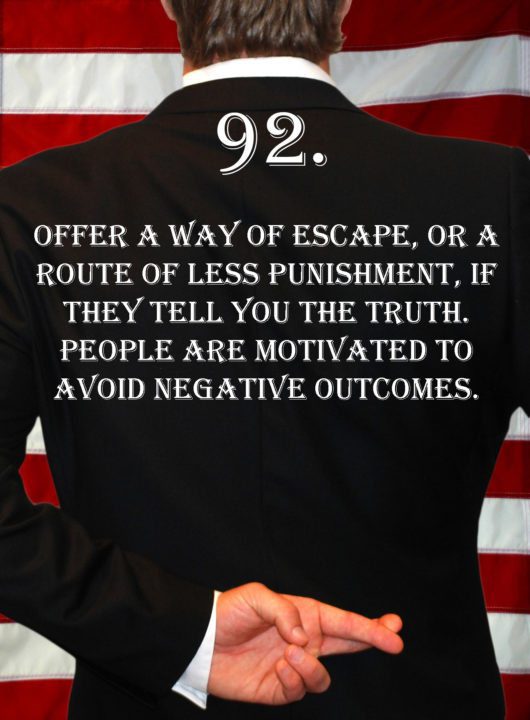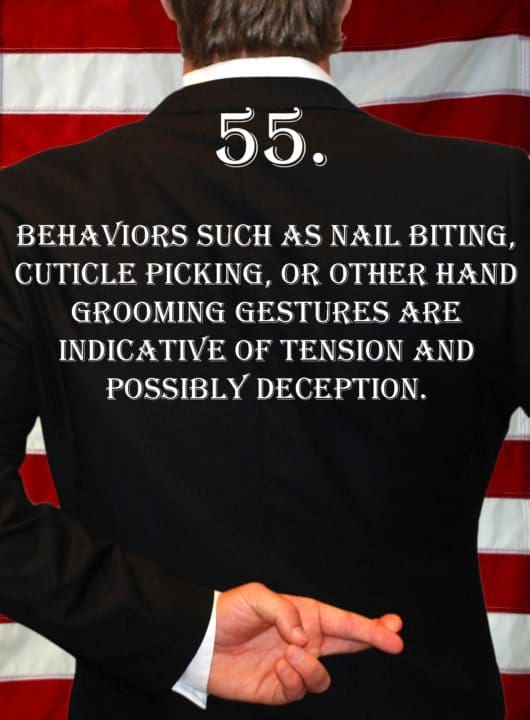
Deception Tip 92:
Offer a way of escape, or a route of less punishment, if they tell you the truth. People are motivated to avoid negative outcomes.
Listen To The Podcast!
E92 – Avoid Negative Outcomes – Deception Tips Podcast – Click Here To Subscribe
Podcast Transcript
Hello and welcome to the Deception Tips podcast where you will learn amazing cues to detect deceit that will help you read people like never before. I’m your host Spencer Coffman, let’s get started.
Hello and welcome to episode number 92 of the Deception Tips podcast. If you’ve been faithfully listening to this podcast, I really want to thank you for doing so and I hope that you’ll do one more thing for me as we near the end of our deception tips. We’ve got 101 total tips and we’re at 92, so not too many left.
In the meantime, while we finish this up, if you would please hop on wherever you’re listening. If it’s iTunes, Stitcher, or if it’s on any platform out there, iHeart radio, Amazon, Alexa, whatever it is, if you could please leave a review for this podcast.
If you’ve been listening this long and you still haven’t left a review, then chances are you really like this podcast because you put up with me for almost 92 episodes or 91 and then this will be 92.
So, please leave a five-star review there, in that case, it’s really simple, it’ll take a couple of minutes of your time and you have no idea how much it will help me out. When you leave a review, you’re letting other people know that this is worth listening to simply before they even listen to it or before they click on it.
They’re going to see those reviews and that is going to drive them to click play. Together, we are going to teach other people how to read other people and detect deception, thereby reducing the number of people that get taken advantage of by lies, so thank you.
Last time, we talked about a deception tip that was really a strategy, this is something that you can use to your own advantage. We talked about hunger and how when people are hungry they aren’t thinking clearly, they’re not themselves when they’re hungry. “Hungry? Grab a …” you’re not yourself, it’s the same type of a deal. When you’re hungry, you’re not thinking as you normally would.
When you’re lying, you’re definitely not thinking as you normally would, you’re thinking about the lie, you’re thinking about getting away with the lie. If you’re lying and you’re hungry, now you have like a double whammy, it’s compounded. So, when someone is questioning someone, make sure if they’re hungry that you continue questioning them.
Now they have a better chance of slipping up, of messing up, or contradicting themselves, so you’ll have a lot more angles to find different loopholes or different errors in their story.
You can use those and call them out, say, ‘well, wait a minute, five minutes ago when you told your story, when you got to this part you said this but just now when you said that again, you said this happened, which is it?’
They’re going to start explaining and you could probably interrupt them to get them a little bit more on edge, saying ‘no, no, no, no, no, let me rephrase that. You said; X, Y, Z, is that true? Yes or no?’ See if they give you the yes or no answer, if they do, you can continue your questioning, if they don’t, you know something is up because it should be yes or no, it’s really simple.
Today, we are going to talk about another tip, this one is about the behavior of liars or a little bit more about their motivation and about the things in lying that they want to achieve or that they want to avoid. It is about how when people lie, think about why they’re lying, they’re lying for a specific purpose.
Either they are lying to help someone else, therefore, they have some altruistic motives that are good, almost. I mean, lying is still a lie but if they’re covering up for someone then it is kind of noble of them and maybe a little heroic or they think it’s noble and they’re misled. Whatever the case is, they are doing something for someone else.
Other people lie to cover up something or to get away from something or to avoid the consequence of a behavior or an action. Therefore, in those types of instances, which is the majority of lies, I wouldn’t say a percentage but if I had to say one, I would say that 80% of the people who are telling these more high-stake lies are lying to avoid something, get out of something, cover something up or hide something.
A smaller percentage, they are lying to protect other people and to help other people. Most of the time though, those lies are bundled. So, if they’re lying to get out of something, they’re also protecting someone.
It’s like both, it’s not black and white, it’s a lot of gray when it comes to lying. Anyway, most of the time, there is that avoidance factor in there, that’s why this tip is going to really help you out.
So, here it is, this is Deception Tip number 92. Offer a way of escape or a route of less punishment if they tell you the truth. People are motivated to avoid negative outcomes. Here it is again, Deception Tip number 92. Offer a way of escape or a route of less punishment if they tell you the truth. People are motivated to avoid negative outcomes.
What does this mean? Well, when someone is lying, you are going to offer them a way of escape, a way out, you see this all the time in the movies. ‘Hey, let’s cut a deal, I’ll tell you what we’re going to do. We spoke to the DA or the prosecuting attorney and they’ve agreed that if you do X, Y, Z, we’ll reduce your sentence or we’ll get you off on this, or you’ll walk completely free.’
‘You just need to tell me what you know, you just need to roll over on this guy, you just need to bury him’ or whatever the case is. They offer them a way out to save their own skin and rat out someone else. Some people in the movies, depending on the movie you see, they’re not going to do that because they’re not going to turn on their partner.
However, the human condition is always motivated to further yourself, we’re very selfish people, self-centered people and we have to be taught to be loyal to other people. Therefore, this is a good thing to use to your advantage because if that person isn’t really loyal or they don’t want to go to jail for them.
They don’t want to lie for them, cover them up, get in trouble, offering this way out may be a good way for them to tell you the truth and for you to get the truth. You can also say a route of less punishment, that would be like, ‘hey, you’re up for life, what if we get you 20 years?’
‘You’re up for five years with no parole, let’s knock that down to two or we’ll get your parole in two then you could be out with good behavior’. You offer a lesser punishment or something a little more pleasing. ‘Hey, you’re going to be grounded for a month if you don’t tell me what happened. If you do, there’s a good chance it may only be a week, it’s up to you, a month or a week’.
So, you can give them these options and let them decide what they want to do with it. Chances are they’re going to snatch up the lesser punishment and people are motivated to avoid negative outcomes. We’re going to talk a lot more about that and a lot more about the different scenarios coming up right after this.
Do you need to see it to believe it? Would you like to be a more effective communicator? If so, then we’ve got videos for you. Subscribe to the Body Language channel on YouTube for more deception tips.
Welcome back to Deception Tip episode number 92, where we are talking about how people are motivated to avoid negative outcomes, they do not like them. Freud said this a long time ago, we are motivated or we have a desire to avoid pain and seek pleasure or seek pleasure and avoid pain. We want to avoid negative outcomes, it is our human nature, and nobody wants to be in a negative situation.
A lot of people are and maybe a lot of people thrive on it, like it or think they like it, don’t know, they love the madness or something but in general, we want to avoid that.
So, when someone is lying, they’re lying to avoid a consequence most of the time. If they’re not then it’s a different scenario but for those people who are lying to avoid that outcome, you can use this because they’re already scared of facing that consequence.
Now, if you tell them about that consequence, we’ve talked about this before, you could use some different things. They have a consequence in mind that they think is going to happen, you may know they’re lying, use another tip, get them to suggest the consequence of what they think might be a good one, that’s episode 27.
If they suggest something lenient, you know they’re probably lying, if they suggest a really good one then they’re probably telling the truth because they’re not afraid of getting that consequence.
However, you can tell them when they suggest that, so that gives you an idea, you can say, ‘well, here’s the appropriate consequence, if we find out you’re lying you’re going to get this’.
‘However, if you tell us the truth, we will knock it down to X, Y, Z’ and give them a lesser punishment for telling the truth. Sometimes they may be like, alright, good, this is my deal, this is my shot, I negotiated for a better price, I’m going to take it and they’ll tell you the truth.
You’ll remember the deal and bam, they’re happy because now they’ve told the truth, they feel good and they’ve avoided that serious consequence, that was the reason for them lying in the first place. So, they found a happy medium, a compromise, you still got the truth but you had to deal with them a little bit. You had to go through all their nonsense of the stories, the lies but you got it.
Another thing you could do, we talked about this in episode 26, is accusing the liar. So, you could accuse them of a greater crime or a greater punishment, something that has a higher consequence to get them to tell you the truth, to fess up to the lesser consequence.
If they’re lying to avoid a certain thing, let’s say they’re lying to avoid being grounded for a week. You can tell them, ‘you know what, you’re going to be grounded for a month if this doesn’t happen or I know that you did this, which means, fine, you can lie to me all you want, you’re going to be grounded for a month.’
They may say, ‘wait a minute, normally when I do XYZ I’m only grounded for a week’. You say, ‘well, that’s different because now I think you did this, you did X, Y, Z, here, you didn’t do that and you did this and it’s worthy of a month’. Now they may fess up and say, ‘no, I only did this, this and this’ and you can say, ‘alright, well, you’re going to get two weeks for lying to me’.
So, you’ll have one week for the punishment and another week for lying about it and you can use this to your advantage. You can accuse them of greater crimes because people are motivated to avoid those negative situations.
The whole reason that they’re lying in the first place was to avoid that consequence. Now if you give them an even greater consequence, they’re going to want to avoid that too especially if they were trying to avoid the first consequence.
Therefore, offer a way of escape, a road of less punishment, they are motivated to avoid those negative outcomes, you will know that right away. When you’re speaking with someone, you will be able to tell whether they are lying to cover up something or to hide something, or whether they are lying to get out of something or avoid a consequence.
You’ll be able to tell if they’re doing a protection liar if they’re lying to cover for someone else or to take the blame for someone else. You’ll see that based on the scenario, the conversation with them, and their responses, you’ll know and understand the situation. So, you’ll be able to have a pretty good judgment of what’s going on and what type of lie it is.
If it’s a lie that they are doing to avoid some kind of consequence, whether positive or negative consequence, you’ll be able to know. You can then offer them different deals or weigh that out, a lesser consequence, and then accuse them of even greater consequences. Tell them that they’re going to be punished with a greater consequence to get them to fess up to avoid that.
No matter what, if they’re lying to avoid a consequence and you slap on a greater one, you better believe they’re going to want to get out of that greater one too.
They’ve already proven that behavior, they’ve proven that theory, they’re lying to get out of whatever they’re lying about. Now if you give them a greater consequence, of course, they’re going to want to get out of that one too.
Therefore, use this to your advantage, offer people ways out, deals, converse with them, and get them to suggest different consequences. Accuse them of greater consequences and then watch for the patterns and clusters of behavior to start to appear and call them out on their lies, if it is necessary. You want to know the truth, that is the whole point of this, it is something that we are striving to learn.
If you show them that you know when they’re lying, that you can read them and you understand their body language and who they are and what they’re saying, they will be more apt to tell you the truth based on that. Now they’ll know that it’s pointless to lie to you. Why would they continue to lie if every time they lie you correct them or call them out?
They’re not going to waste their energy, it’s not going to be efficient for them, and they’re going to realize that they’re not going to get away with it. They’re going to feel a little bit helpless and they’ll tell you the truth. Even if they don’t, you’ll be able to spot the truth and get it out of them anyway.
So, I want to thank you for listening to this week’s episode of the Deception Tips podcast. I hope that you’ll share it with your friends, subscribe to the feed, check out the Deception Tips videos, the blog and take a look at the books I have available, and, as always, tune in next week for a new deception tip.
Video Transcript
Hey guys, my name is Spencer Coffman, thank you for watching the deception tips videos. They’re all about teaching you how to read people and detect deception so that you will be able to tell if someone is lying to you. Today, we’re going to talk about a technique that you can use to help get the truth from someone. This is something that you’d use when the person realizes that they might be in trouble.
You may have already caught them in their lie, you might have challenged them a little bit and now you’re trying to get them to admit to the truth or to tell you the truth at this point. So, you’re going to offer them an escape if they comply, it’s a very popular technique, people use it on their kids all the time and generally it works pretty well.
So, here it is, this is deception tip number 92. Offer a way of escape or a route of less punishment if they tell you the truth. People are motivated to avoid negative outcomes. So, you want to offer a way of escape or less punishment if they tell you the truth, not when or whatever. You’re going to get it from them, but this is a one-time deal, you need to give them a sense of urgency.
It’s not something that you’re going to be talking to them and you’re going to offer this and then a little while later they say, okay, I’m ready now. No, no, no, the time has passed, you already had your chance, now you can tell me but it’s too late. So, it’s a sense of urgency, you want to make them feel like this deal isn’t going to last forever and that if they tell you the truth now they can avoid some type of punishment or negative consequence.
Again, this is something that’s very popular in movies usually, someone will walk in, the DEA, and they’ll say, well, the prosecuting attorney is going to offer you a one-time plea bargain for this. Sometimes people plea so they don’t have to risk getting a larger sentence, that’s not what this is, it’s a similar tactic, it’s the same principle.
This is more like, look, if you tell me the truth, you’ll only be in trouble for what you did, not for lying about it. I’ll remove that punishment or that consequence so you’re going to get off the hook for lying. Remember that when people lie, they’re stressed about a lot of things, they’re worried about a lot of things. They’re worried about what they did, they’re worried about lying about it, they’re worried about the consequence of lying about it, etc.
So, if you say, look, I know this is what you did, you’re going to be in trouble for that, if you tell me the truth right now then I’ll forget that you lied about it, we’ll just move on and move past that and go forward. Hopefully, they’ll tell you the truth but if they don’t and then they tell you later well, now you are in trouble for lying about it and for whatever you did.
So, make it urgent, give it a sense of urgency, because people are motivated to take the lesser or the route of least resistance, they don’t want to be in trouble. If you say look, there’s this or this, this one is more, this is less, and you can get off easier, most people want to take the easy way out.
They want a scapegoat, they want to get off with a slap on the wrist or something light, they don’t want the heavy, maximum sentences, punishments, consequences or whatever you want to call them. People are motivated for self-preservation, therefore, use that technique and allow them to make the choice to tell you the truth by giving them a little bit of an incentive.
So, if this is your first time watching these videos, I’d love to have you subscribe to the channel on YouTube. Feel free to comment with any questions you may have as well. Also, if you’d like some more information, we have books, podcasts, blog posts all available on spencercoffman.com that are dedicated to teaching you exactly what every body is really saying.
Until next time.




